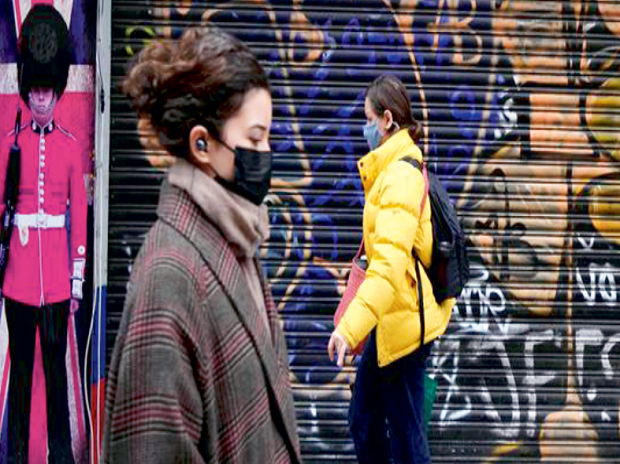The UK appears to have surpassed the peak of the latest wave of Covid-19 caused by Omicron, a promising sign that the highly transmissible variant’s impact may be brief, if intense, and fueling optimism that the pandemic may be waning.
Scientists say British data offer encouraging signs for countries behind the UK in the Omicron wave—such as the US—that the variant is echoing the pattern it followed in South Africa, where cases rose rapidly over the course of just over a month, before falling back.
The seven-day average of new daily cases of Covid-19 in the UK has been falling for a week and on Tuesday dropped below the 14-day average for the first time since November, according to a Wall Street Journal analysis of official data. Both are signs that caseloads are diminishing.
The rate of increase in the number of new Covid-19 hospitalizations has also slowed and in England—and especially London, which experienced the Omicron wave sooner than other regions—new hospital admissions with Covid-19 are falling. The first cases of Omicron were detected in the UK on November 27.
Meanwhile, in USA, the explosion of omicron cases along the Interstate 95 corridor from the Mid-Atlantic to New England is showing signs of slowing down, according to health officials and epidemiologists, offering reason for cautious optimism that the turning point could be near and that the coronavirus variant’s US trajectory is similar to that of other countries.
New York Gov. Kathy Hochul (D) said Tuesday the rates of tests returning positive and case increases seem to be slowing—particularly in New York City, which emerged as an early epicenter of the highly contagious variant.
Scientists caution, however, that caseloads and hospital admissions may yet reverse course as social mixing increases with the end of the holiday season and the start of the new school term.
Up to now, the British experience has further bolstered the conviction that Omicron is milder than previous versions of the virus—at least in places like the U.K. where vaccination rates among older and more vulnerable people are very high.
The trends are generating optimism that the worst of Omicron—and possibly the whole pandemic—is receding. Prime Minister Boris Johnson has signaled he isn’t likely to maintain limited public-health restrictions, such as working from home, that were put in place to contain Omicron beyond January 26, when they are due to expire.
 Dear Reader,
Dear Reader,
Business Standard has always strived hard to provide up-to-date information and commentary on developments that are of interest to you and have wider political and economic implications for the country and the world. Your encouragement and constant feedback on how to improve our offering have only made our resolve and commitment to these ideals stronger. Even during these difficult times arising out of Covid-19, we continue to remain committed to keeping you informed and updated with credible news, authoritative views and incisive commentary on topical issues of relevance.
We, however, have a request.
As we battle the economic impact of the pandemic, we need your support even more, so that we can continue to offer you more quality content. Our subscription model has seen an encouraging response from many of you, who have subscribed to our online content. More subscription to our online content can only help us achieve the goals of offering you even better and more relevant content. We believe in free, fair and credible journalism. Your support through more subscriptions can help us practise the journalism to which we are committed.
Support quality journalism and subscribe to Business Standard.
Digital Editor

RECOMMENDED FOR YOU